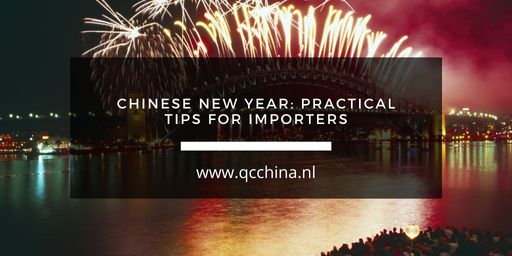Chinese New Year: Practical Tips for Importers
Once again, Western companies and importers can rely on the Chinese New Year celebration to significantly disrupt the supply chain. Therefore, below you will find some practical tips for importers with suppliers based in China.
Many Chinese factory workers return to their families and friends during this time to celebrate the new calendar year together. Most of the workers leave the factory early, so they can spend a longer time period with their families.
What’s special about the Chinese New Year?
The Chinese New Year is a special event because it lasts much longer (15 days) than the Western New Year. During this period, around 400 million people travel across the country to spend their holidays with their families.
Most Chinese factories will close their doors during this time. As a result, the supply chain often comes to a standstill, which leads to delays in shipping orders. The date of the Chinese New Year celebration is between January 21st and February 21st of each year.
Influence of Chinese New Year on the supply chain
Chinese New Year has a significant impact on the supply chain every year. For western importers, this can cause a significant delay in the delivery time of the products.
It is important to minimize the risks, because otherwise importers run the risk that orders will not arrive in Europe until weeks or months later, for example.
It is therefore doubtful that the products meet the quality requirements.
This can also be due to the absence of employees. When a manufacturer has to replace staff, the question is whether they have the right skills to make exactly the same products.
Practical tips for importers
Below you will find some practical tips for avoiding supply chain delays ahead of the Chinese New Year.
1. Work with reliable suppliers
It is advisable for Western importers to work with reliable suppliers in China. This includes businesses that value quality, provide a stable work environment for their employees, and use a reliable management system.
In the lead-up to Chinese New Year, these factories can immediately anticipate potential staff shortages. A supplier with financial or legal problems is more likely to decide to keep the factory doors closed during this period.
Therefore, it is also advisable to avoid possible collaborations with new suppliers just before Chinese New Year. Western companies and importers must wait until after the holiday for the manufacturer’s quality to be checked first.
Conducting a factory audit offers a solid solution for this, because this audit simply maps the quality and competence of a supplier. In this way, importers can verify their future supply chain, before building, for example, Chinese business relationships, which they later regret.
2. Try to avoid quality problems
Many Chinese factories will be expanding their production lines as the new year approaches. Most suppliers during this period will rush to process as many orders as possible in a short time. It also allows orders to be dispatched faster than usual as more and more workers decide to take time off.
The above factors can all contribute to a wide variety of supply chain issues. It is therefore important to carry out sufficient quality controls at the manufacturer’s premises during this period, so that the quality of the products is maintained.
3. Monitoring logistical problems
Given the turbulent time around the Chinese New Year, it is essential to monitor for any logistical problems. China’s infrastructure will also come under considerable pressure during this period.
As a result, it may happen that some problems arise with, among others; the loading and unloading of products, the availability of shipping containers and other delays related to transport.
As a Western importer, it may therefore be important to take the above problems into account so that they can be prevented in the future. For example, consider:
- Increase current stock levels.
- Book well in time and keep checking quality of products.
- Plan your orders for after Chinese New Year in advance.
- Set future deadlines with suppliers.
- Congratulate Chinese suppliers and business associates.
4. Continuously monitor product quality
At the end of the Chinese New Year, many workers return to the factory to resume their work. However, some employees no longer return to their factory, but decide, for example, to work elsewhere or to take longer vacations.
The logical consequence of this is that new employees are hired instead. These employees are often less experienced, or have not received clear instructions. Due to the lack of clearly documented work methods, training and quality requirements, these new employees can often produce lower quality products at the start.
Contact us
Want to learn more about importing products during Chinese New Year? Do not hesitate to contact us. QC China helps Western companies and entrepreneurs in various countries outside of Europe to improve their supply chain.




